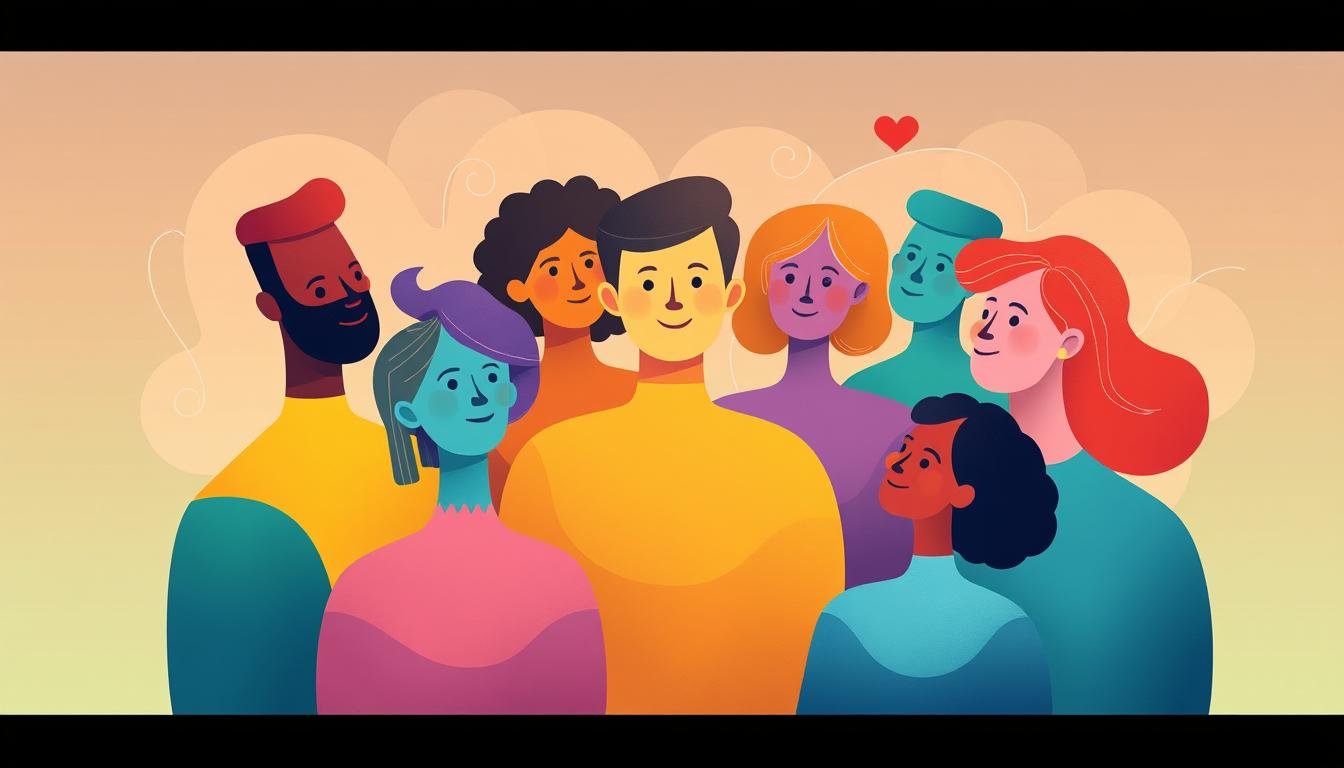Personality and Social Support: Building Connections
Sarah, a reserved introvert, always felt out of place at social gatherings. She’d watch her extroverted friends effortlessly mingle, wondering why she couldn’t do the same. Little did she know that her personality type wasn’t a barrier, but a unique strength in forming deep, meaningful connections. Sarah’s journey of self-discovery and building social support would challenge everything she thought she knew about interpersonal skills and emotional intelligence.
A recent study of 949 Canadian residents during the COVID-19 pandemic revealed surprising insights about personality and social support. Contrary to popular belief, individuals with lower extraversion levels showed a stronger correlation between social support and happiness. This finding suggests that introverts, like Sarah, may benefit more from close friendships and family bonds than their extroverted counterparts.
The study found that for those with low extraversion, lower social loneliness was significantly linked to greater happiness. Additionally, higher social support from friends and family members was more strongly correlated with subjective happiness for individuals with low extraversion compared to those with high extraversion.
These findings challenge the notion that extroverts have an inherent advantage in building social connections. Instead, they highlight the importance of understanding one’s personality traits and leveraging them to create meaningful relationships. For introverts, quality over quantity in social interactions may be the key to enhancing well-being and fostering resilience.
Key Takeaways
- Introverts may benefit more from close social connections than extroverts
- Lower social loneliness correlates with greater happiness for less extroverted individuals
- Quality of social support matters more than quantity for introverts
- Understanding personality traits can help in building effective social connections
- Emotional intelligence plays a crucial role in forming meaningful relationships
- Social support significantly impacts both mental and physical health
The Importance of Social Connection in Lifestyle Medicine
Social connections are key to our health and happiness. Research shows they greatly affect our physical and mental health. Let’s see how these connections shape our lives and why they’re crucial in lifestyle medicine.
Impact on Physical Health
Studies show social connections deeply impact our physical health. Those with strong social support have better heart health and live longer with cancer. In fact, having good social ties can be as beneficial as quitting smoking or staying fit.
Effects on Mental Well-being
Our mental health also benefits from social connections. Strong ties help reduce depression and improve our overall well-being. Emotional intelligence and empathy help us connect with others better.
Social Connections as a Vital Sign
Doctors now see social connections as a vital sign in lifestyle medicine. Like checking blood pressure, they look at our social networks for health insights. They advise patients to build and keep social connections as part of their care.
| Health Factor | Impact of Social Connections |
|---|---|
| Mortality Risk | 50% reduction |
| Cardiovascular Health | Improved outcomes |
| Mental Health | Reduced depressive symptoms |
| Cancer Survival | Increased rates |
By improving our social connections and communication, we boost our health. Remember, strong relationships are essential for a healthy lifestyle, not just a social bonus.
Understanding the Psychological Foundations of Connection
The roots of human connection are deep. Studies reveal that strong social ties are vital for our mental well-being. Those with a strong support network face less risk of depression and anxiety. This shows how crucial resilience is in keeping these bonds strong.
Knowing ourselves is key to forming deep relationships. Self-awareness lets us grasp our needs and feelings, making it simpler to connect with others. Active listening is also essential. It helps us build stronger, more supportive ties by truly hearing each other.
- Emotional support
- Informational support
- Tangible support
- Companionship
Support can come from family, friends, community groups, or healthcare providers. Each group has a special role in boosting resilience and health.
“Close and caring relationships are linked to health and well-being at all stages in the lifespan.”
A 2012 study by Holt-Lunstad & Smith showed that meaningful relationships are more important than many lifestyle choices. This highlights the vital role of social connections in our lives.
| Benefits of Strong Social Connections | Impact on Well-being |
|---|---|
| Better mental health | Higher levels of happiness and life satisfaction |
| Lower morbidity rates | Improved physical health outcomes |
| Reduced mortality risk | Longer life expectancy |
By grasping these psychological foundations, we can build stronger, more supportive relationships. This boosts our resilience and improves our overall life quality.
Personality and Social Support: Key Concepts
Understanding personality traits and social support is key to strong relationships. These elements shape our skills in interacting with others. They affect how we communicate and connect with people.
Defining Personality Traits
Personality traits are patterns of behavior that define us. Five main traits are extraversion, neuroticism, conscientiousness, agreeableness, and openness. These traits are crucial in our social interactions and building relationships.
Types of Social Support
Social support has different forms, each with its own role in our lives:
- Emotional support: Offers empathy and care
- Instrumental support: Provides practical help
- Informational support: Shares advice and guidance
Interaction Between Personality and Support
A study with 1,309 adults over four years showed interesting findings. Emotional stability was linked to perceived social support. Social support also affected personality traits over time.
| Personality Trait | Impact on Social Support |
|---|---|
| Extraversion | Strongly linked to perceived social support |
| Emotional Stability | Positively associated with social support |
| Agreeableness | Contributes to aspects of social support |
These findings stress the need to nurture our skills in interacting with others. By understanding our traits and their impact, we can build stronger, more meaningful connections.
The Physiological Basis of Social Bonding
Social bonding is key to our well-being, affecting both our bodies and minds. It shows us the amazing science behind our connections and why social support is crucial.
Oxytocin, known as the “bonding hormone,” is central to social bonding. It’s released when we touch or hug each other. Oxytocin, along with GABA, serotonin, and dopamine, helps us feel connected and happy.
Studies show that people with strong social ties are healthier. A review of 28 studies found that social support boosts our mental health. But, negative interactions can harm us more than positive ones, showing the importance of supportive relationships.
“The quality of our social connections can significantly influence our overall well-being and ability to cope with life’s challenges.”
Learning about social bonding’s science helps us improve our communication and empathy. By understanding its biological role, we can focus on nurturing our relationships. This makes us stronger when facing tough times.
Building and Maintaining Friendships Across the Lifespan
Friendships are crucial for our well-being. They offer support and make us feel better. Studies show that strong social bonds can lower the risk of early death from heart issues and chronic diseases.
Strategies for Making New Connections
Building new friendships starts with shared interests. Be open to new experiences. Try joining clubs, volunteering, or going to community events to meet people with similar interests.
Even small social interactions can greatly improve mental health.
Nurturing Existing Relationships
Keeping friendships alive takes effort and commitment. Listen actively to your friends’ needs and concerns. Regular communication, whether face-to-face or online, keeps friendships strong.
Adults usually have three close friends, showing the value of quality over quantity.
Overcoming Social Anxiety
For those with social anxiety, making friends can be tough. Start small by talking briefly with people you know or join online groups with shared interests.
Learning to resolve conflicts is key to healthy friendships. Deal with issues quickly and respectfully to avoid misunderstandings. Positive friendships are linked to better physical and mental health.
| Friendship Factor | Impact on Health |
|---|---|
| Strong social connections | Lower risk of premature death |
| Poor-quality friendships | Twice the risk of early death |
| Loneliness | 26% increased risk of early death |
The Role of Emotional Intelligence in Social Connections
Emotional intelligence is key in making and keeping friends. It helps us understand and control our feelings and those of others. This skill is vital for building lasting, caring relationships.
A study with 912 Spanish high school students showed how emotional intelligence and social skills are linked. The research found a strong positive link between these two (B = 0.44, p
The study also found a negative link between emotional intelligence and bullying (B = −0.56, p
This shows how important emotional intelligence is for good social connections. By improving self-awareness and empathy, we can make better friends and avoid bullying.
| Factor | Relationship with Emotional Intelligence | Correlation Coefficient |
|---|---|---|
| Social Skills | Positive | 0.44 |
| Bullying | Negative | -0.56 |
| Social Skills and Bullying | Negative | -0.38 |
Working on emotional intelligence can make our social lives better. It helps us talk well, solve problems, and understand others. By improving these skills, we can build stronger, more caring social circles that help us feel good.
Cultural Influences on Social Support and Resilience
Culture greatly influences how we see and use social support. It shapes our skills in interacting with others and building relationships. Each culture has its own way of using social connections to build resilience.
Collectivist vs. Individualistic Societies
In collectivist cultures, people often rely on group support. They value flexibility and mutual aid. On the other hand, individualistic societies focus on independence and personal effectiveness. These differences affect how we communicate and seek help.
Cross-cultural Perspectives on Friendship
Friends are important in all cultures, but their roles can vary. Some cultures see friends as family. Others keep friendships more casual. Understanding these views helps in building relationships across cultures.
| Culture Type | View on Friendship | Social Support Style |
|---|---|---|
| Collectivist | Strong, family-like bonds | Group-oriented, shared responsibilities |
| Individualistic | More casual, personal choice | One-on-one support, respect for privacy |
Adapting Social Skills Across Cultures
To thrive in diverse settings, people need to adjust their social skills. This means learning new ways to communicate and show respect. It’s about being open to different social norms and expectations. By doing so, individuals can build stronger, more resilient relationships in any cultural context.
Research shows that understanding cultural differences in social support is key to mental health. A study of 23,192 people found that social support profiles vary significantly across age groups and cultures. This knowledge can help in creating better mental health programs, especially in countries with fewer resources.
Digital Age Challenges and Opportunities for Social Support
The digital age has changed how we communicate and build relationships. Technology connects us, but it can also make us feel alone. Studies show a drop in companionship over the last 20 years, possibly due to smartphones and social media.
A survey in China during the COVID-19 lockdown found some interesting things:
| Survey Period | Number of Participants |
|---|---|
| During Lockdown | 1,131 |
| After Lockdown | 407 |
The study found a link between active social media use and happiness. It showed that feeling connected online can help us feel less lonely. This suggests digital platforms can help us stay strong during tough times.
But, the effect of social media on our well-being is not simple. Just scrolling can make us feel worse, but using it actively can help. For teens, the digital world brings its own set of problems:
- 95% of US teens have at least one mobile device
- 89% own a smartphone
- Older teens spend an average of 6.67 hours daily on screen media
These numbers show we need to use digital tools wisely. By making online connections meaningful and using tech for support, we can face the digital age’s challenges. We can also find opportunities for connection and resilience.
Enhancing Social Support in Professional Settings
Social support is crucial in the workplace. It makes us happier, more productive, and helps us grow in our careers. Let’s look at how to make a supportive work environment and connect our work and personal lives.
Building a Supportive Work Environment
A positive workplace needs open communication and teamwork. Studies show that support greatly affects job happiness. A study found a strong link between support and job satisfaction, showing 19% of the difference.
Good interpersonal skills are essential for workplace relationships. Feeling supported reduces burnout. The same study showed support indirectly lowers emotional exhaustion, with a strong link.
Networking and Career Development
Networking is key for career growth. It brings new connections and opportunities. Good communication skills are vital for networking. They help create lasting professional relationships and aid in career advancement.
Work-Life Balance and Social Connections
Keeping a healthy work-life balance is important for personal relationships. These relationships improve our overall well-being and job performance. Studies highlight the importance of recovery experiences, both at work and outside, for employee health and motivation.
| Aspect | Impact on Well-being | Impact on Job Performance |
|---|---|---|
| Social Support | Reduces psychological distress | Increases job satisfaction |
| Work-Life Balance | Improves personal relationships | Enhances productivity |
| Networking | Expands social connections | Boosts career opportunities |
By focusing on building relationships, professionals can create a supportive network. This network benefits both their personal and professional lives. A holistic approach to social support leads to long-term success and well-being at work.
Conclusion: Fostering Resilience Through Social Connections
Building strong social connections is crucial for resilience and well-being. Research highlights that quality relationships matter more than how many we have. A study of 1,015 adolescents found that self-esteem and social support are key to mental health and resilience.
Emotional intelligence is essential for forming and keeping these supportive bonds. It helps us understand social situations and respond to others’ needs. By improving our emotional intelligence, we can make deeper connections that help us face life’s challenges.
Building relationships is important in both personal and professional life. A supportive work environment can boost job satisfaction and productivity. As we use technology, we must use it to strengthen our connections, being careful of its downsides.
By focusing on social support and building relationships, we lay a strong foundation for resilience. This not only helps our mental health but also our physical health. Studies show that strong social support can lower medical problems and death rates. In our changing world, building resilience through social connections is vital for a healthy, fulfilling life.
Source Links
- Are social support, loneliness, and social connection differentially associated with happiness across levels of introversion-extraversion?
- Frontiers | The Relationship Between Big Five Personality and Social Well-Being of Chinese Residents: The Mediating Effect of Social Support
- The relationship between social support, coping strategies and psychological distress and positive mental well-being in carers of people with borderline personality disorder – Borderline Personality Disorder and Emotion Dysregulation
- The Connection Prescription: Using the Power of Social Interactions and the Deep Desire for Connectedness to Empower Health and Wellness
- Social Psychology and Anthropology » Blog Archive » Power of Social Interactions and the Desire for Connectedness to Empower Health and Wellness
- Social Relationships and Health: A Flashpoint for Health Policy
- Understanding The Social Support Theory
- New Look at Social Support: A Theoretical Perspective on Thriving through Relationships
- The role of personality traits and social support in relations of health-related behaviours and depressive symptoms
- Microsoft Word – ARQOL-accepted article.docx
- Social Support, Negative Social Interactions, and Psychological Well-Being
- The Functions of Social Bonds: Perspectives From Research on Social Support, Loneliness and Social Isolation
- The science of friendship
- Adult friendship and wellbeing: A systematic review with practical implications
- Relationship between Emotional Intelligence, Social Skills and Peer Harassment. A Study with High School Students
- How Does Social Support and Emotional Intelligence Enhance Life Satisfaction Among Adolescents? A Mediational Analysis Study
- Emotional Intelligence and Perceived Social Support: Its Relationship with Subjective Well-Being
- A systematic review of cross-cultural measures of resilience and its promotive and protective factors
- Effects of sources of social support and resilience on the mental health of different age groups during the COVID-19 pandemic – BMC Psychiatry
- Social media use, perceived social support, and well-being: Evidence from two waves of surveys peri- and post-COVID-19 lockdown
- Adolescent Mental Health in the Digital Age: Facts, Fears and Future Directions
- Social Support and Employee Well-Being: The Conditioning Effect of Perceived Patterns of Supportive Exchange
- Social Support and Its Impact on Job Satisfaction and Emotional Exhaustion
- 6 Tips for Increasing Social Support
- Social Support and Resilience to Stress: From Neurobiology to Clinical Practice
- Social support, resilience, and self-esteem protect against common mental health problems in early adolescence: A nonrecursive analysis from a two-year longitudinal study








